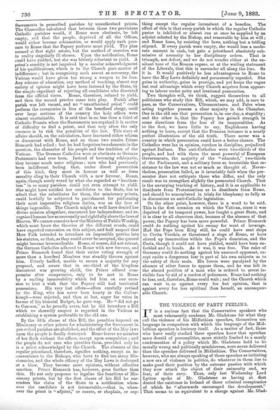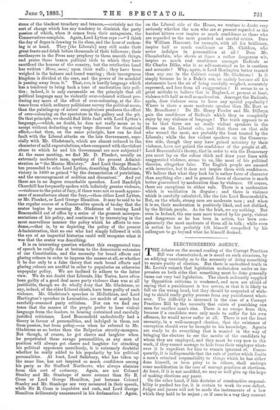THE VIOLENCE OF PARTY FEELING.
IT is a curious fact that the Conservative speakers who most vehemently condemn Mr. Gladstone for what they call the violence of his Midlothian speeches, themselves use language in comparison with which the language of the Midlothian speeches is leniency itself. As a matter of fact, those who have really studied these speeches know that speeches more devoid of personalities, more strictly limited to a manly condemnation of a policy which Mr. Gladstone held to be morally wrong and politically mischievous, were never delivered than the speeches delivered in Midlothian. The Conservatives, however, who are always speaking of those speeches as initiating a new era of violence in politics, do whatever in them lies to make good their position by the extreme passion with which they now attack the object of their animosity and, we fear, of their envy. Thus, only last Wednesday Lord Lytton spoke of Mr. Gladstone as having at first denied the existence in Ireland of those criminal conspiracies of which he "afterwards encouraged the development." That seems to us equivalent to a charge against Mr. Glad stone of the blackest treachery and treason,—certainly not the sort of charge which has any tendency to diminish the party passion of which, when it comes from their antagonists, the Conservatives complain. Again, Lord Lytton says :—" I think the day of dupes is drawing to its close, and the hour of reckoning is at hand. They [the Liberals] may still make their great feasts and drink before thousands of their followers ; their soothsayers in the Press may prophesy to them smooth things, and praise those brazen political idols to which they have sacrificed the honour of the country, but the retributive hand has written Mene, mene,' upon their walls ; they have been weighed in the balance and found wanting ; their incongruous kingdom is divided at the core, and the power of its mischief is passing away from it." That, too, is hardly language which has a tendency to bring back a tone of moderation into politics; indeed, it is only excuseable on the principle that all political language may be violently over-coloured without producing any more of the effect of over-colouring, at the distance from which ordinary politicians survey the political scene, than the painting-up of actors' complexions produces the effect of over-colouring on the spectators in the gallery and the pit. On that principle, we should find little fault with Lord Lytton's language,—which, no doubt, he does not really mean us to accept without deducting a very large discount for theatrical effect,—but then, on the same principle, how can he find fault with the Liberal attacks on the late Government, especially with Mr. Gladstone's, which are almost reduced to the. character of mild expostulations, when compared with the violent abuse to which he and his Government are now subjected? At the same meeting, we find Mr. D. Plunket, usually an extremely moderate man, speaking of the present Administration as "the Maniac Ministry." And Lord George Hamilton proceeded to echo Lord Lytton, describing Mr. Gladstone's victory in 1880 as gained "by the denunciation of patriotism, and the encouragement of sedition and discontent." And yet these are in no degree remarkable speeches. Lord Randolph Churchill has frequently spoken with infinitely greater violence, —violence to the point of fury, if there were not so much appearance of manufacture about the fury,—than either Lord Lytton, or Mr. Plunket, or Lord George Hamilton. It may be said to be the regular course of a Conservative speech of to-day that the orator begins by accusing Mr. Gladstone of turning Lord Beaconsfield out of office by a series of the grossest misrepresentations of his policy, and continues it by travestying in the most marvellous manner the policy whieh he affects to condemn,—that is, by so depicting the policy of the present Administration, that no one who had simply followed it with the eye of an impartial historian could well recognise what it was that the orator was describing.
It is an interesting question whether this exaggerated tone of speech be really due at bottom to the democratic extension of our Constitution, and the necessity for broad effects and glaring colours in order to impress the masses at all, or whether it be due only to a false theory that such broad effects and glaring colours are needful in order to popularise an otherwise unpopular policy. We are inclined to adhere to the latter view. We do not doubt that Liberals, like Tories, have often been guilty of a good deal more party violence than was at all justifiable, though we do wholly deny that Mr. Gladstone, or any, indeed, of the elder Liberal chiefs, have been guilty of such violence. Mr. Gladstone's speeches in Midlothian, and Lord Hartington's speeches in Lancashire, are models of manly but carefully-reasoned party criticism. Nor can we find any trace that the masses of the people prefer to hear violent language from the leaders, to hearing restrained and carefully justified criticisms. Lord Beaconsfield undoubtedly had a theory in favour of personalities, and indulged in them, not from passion, but from policy,—as when he referred to Mr. Gladstone as no better than the Bulgarian atrocity-mongers. But though, of course, he got cheers and laughter when he perpetrated these savage personalities, as any man of position will always get cheers and laughter for attacking his political opponents mercilessly, it is extremely doubtful whether he really added to his popularity by his political personalities. At least, Lord Salisbury, who has taken up the same line, has not inspired so much confidence among his party as Sir Stafford Northcote, who always abstains from this sort of acrimony. Again, are not Colonel Stanley and Mr. Stanhope of more account than Sir R. Cross or Lord George Hamilton, just because Colonel Stanley and Mr. Stanhope are very measured in their speech, while Sir R. Cross is impulsive and rash, and Lord George Hamilton deliberately unmeasured in his declamation ? Again, on the Liberal side of the House, we venture to doubt very seriously whether the men who are at present regarded as the hardest hitters ever inspire so much confidence as those who are regarded as the most guarded and careful critics. Does Sir William Harcourt, for example, with all his brilliancy, inspire half as much confidence as Mr. Childers, who
never indulges in personalities at all ? Does Mr. Chamberlain, who shows at times a rather dangerous wit, inspire so much real confidence amongst Radicals as Sir Charles Dilke, who is as self-restrained as he is cautious and accurate ? Why, again, is Lord Hartington better trusted than any one in the Cabinet except Mr. Gladstone ? Is it simply because he is a Duke's son, or mainly because all his statements have the air of being carefully weighed, accurately expressed, and free from all exaggeration ? It seems to us a great mistake to believe that in England, at present at least, violence tells half as well as moderation. Amongst the Radicals, again, does violence seem to have any special popularity ? Where is there a more moderate speaker than Mr. Burt or Mr. Broadhurst ? Do Mr. Henry Fowler and Mr. Dillwyn gain the confidence of Radicals which they so completely enjoy by any violence of language ? The truth appears to us to be that there are no really violent speakers in the House on the. Liberal side, and that those on that side who wound the most, are probably the least trusted by the Liberals ; while the few violent speakers on the Conservative side, though they may have gained notoriety by their violence, have not gained the confidence of the people at all. Lord Beaconsfield's theory, that in order to win the Democracy you must lay on the colour thick and draw your lines with exaggerated violence, seems to us, like most of his political theories, altogether false. The English people are amused with invective, but it does not inspire them with confidence. We believe that what they look for is rather force of character than anything else ; and in general, force of character is much better guaranteed by moderation than by violence. Of course, there are exceptions to either rule. There is a moderation which is vacillation in disguise ; and there is violence which is carefully calculated, like the late Lord Beaconsfield's. But, on the whole, strong men are moderate men ; and when it is so, their moderation is positively liked, and not disliked, by the British people. As for the Irish, we say nothing. But even in Ireland, the one man most trusted by his party, violent and dangerous as he has been in action, has been conspicuously the most moderate of them all in talk ; while even in action he has probably felt himself compelled by his colleagues to go beyond what he himself desired.



































 Previous page
Previous page